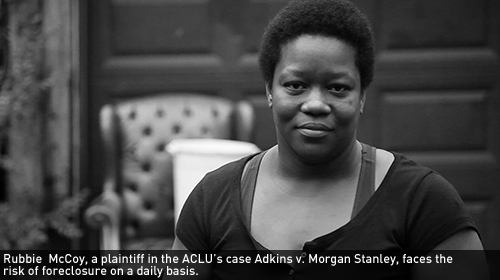The Racial Wealth Accumulation Gap and Why ACLU is Suing Morgan Stanley for Racial Discrimination


This month, the Urban Institute joined an emerging consensus of researchers and social scientists with a new report revealing, in the starkest terms, our nation's vast and widening racial gap in wealth creation. With this report, , the Urban Institute joins a showing that in America today, wealth is not colorblind and that .
Sixty years after the social and legislative achievements of the Civil Rights movement, the amount of wealth the average American acquires remains powerfully influenced by the color of his or her skin. These inequalities set in early and perpetuate themselves over time. Families with little wealth to begin with have less to pass to their children though inheritance, college funding, or a down payment on a house. This creates a vicious cycle, as those children themselves enter adulthood without a starting boost to wealth accumulation of their own.
Measured across the economic cycle, wealth accumulation trends present a similarly disturbing picture: When times are good, whites do comparatively better than blacks and Latinos, and when times are bad whites feel the pain less. Most recently, while the housing collapse and Great Recession injured Americans of all stripes, Latino and black families saw the loss of 40 and 31 percent of their wealth, respectively, while white families escaped with an average wealth loss of only 11 percent. In a society largely premised on the colorblind ideal, our booms and busts remain anything but.
More than any other single factor, the racial wealth gap is driven by access to fair housing and homeownership. Generations of both official and de facto residential segregation have frozen non-white borrowers out of the home lending market, and thus out of the primary mechanism for wealth accumulation in America. Where mainstream lenders refused to go, predatory subprime lenders rushed in. Responding to Wall Street's requirements for increased volume and worse terms, subprime lenders targeted black and Latino communities for loans of the most toxic and predatory variety. Even controlling for income, employment, and education, black and Latino borrowers were far more likely than whites to receive subprime loans with destructive features. As a result, they were far more likely to lose their homes to foreclosure, and, because homeownership represents a comparatively greater share of black and Hispanic families' wealth, to feel that loss more deeply.
The landmark legislative achievements of the civil rights movement, Fair Housing Act, Equal Credit Opportunity Act, and others, represent our nation's determination to consign a racialized hierarchy of wealth and privilege to the past. As wrong doing by banks and lenders become ever more apparent, these same anti-discrimination laws are providing a vehicle for victims of the racial rescission to fight back.
One key battle is being fought in Detroit, in Adkins v. Morgan Stanley, where five African-American current and former homeowners have taken Wall Street giant Morgan Stanley to court for its role in foisting bad loans on black neighborhoods. Like African-American borrowers across the city, these five individuals received loans whose terms were worse in almost every possible way than those offered to similarly situated white borrowers. Although civil rights law clearly prohibits behavior of this kind, Morgan Stanley's myopic pursuit of profit led it to ram ever more toxic loans into minority communities, heedless of the costs. And those costs could not be more plain: Detroit neighborhoods transformed into ghost towns by mass-foreclosure, with the loss of decades of accumulated wealth by those least able to spare it. We at the ACLU, along with the National Consumer Law Center, and the law firm Lieff Cabraser Heimann & Bernstein, are proud of our role as counsel to these five brave individuals.
But while it's too late to prevent the last housing collapse, it is not too late to prevent the next one—or to hold civil rights violators accountable for their acts. Closing the racial wealth accumulation gap—the existence of which is so persuasively demonstrated by the Urban Institute and others—means ensuring access to housing and the housing market without discrimination of any kind. Indeed, our nation's civil rights laws exist for exactly this reason. By courageously taking this fight to Morgan Stanley, one of the world's most powerful financial institutions, the five Detroit plaintiffs are showing that no one enjoys impunity from the law. They also show that the core legislative achievements of the Civil Rights movement remain vital tools for ensuring social and economic justice for all Americans.
Learn more about housing discrimination and other civil liberty issues: Sign up for breaking news alerts, , and .

